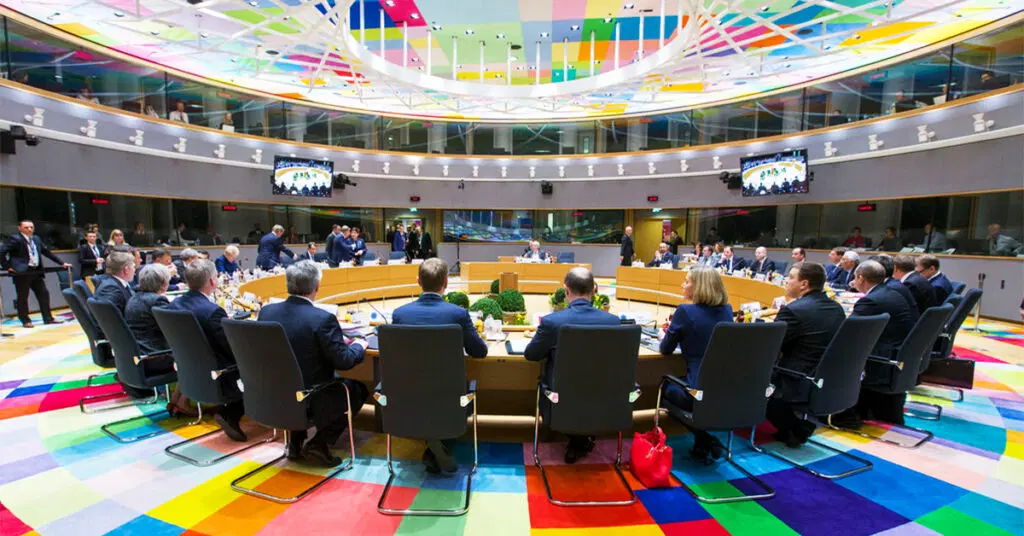Komentář: Zasedání Evropské rady v březnu 2019

|
Is what the EU Council decided to do, instead of Theresa May, who has now not only lost her say on when the UK will leave the EU, but has seen the terms of the departure dictated to her by EU leaders. Various heads of state and government have shown their deep exasperation with the negotiating tactics of May, and threats of vetoing any extension, such as the ones sounded by Emmanuel Macron, should be seen as nothing less than a sign of this deep distrust for May’s leadership, especially coming from countries who have spent months preparing themselves for the potential consequences of no deal, which is today still not off the table, even if the “two date” compromise seems to indicate that no one wishes it. The compromise that was eventually found highlights the essential leadership of Donald Tusk and Jean-Claude Juncker, who have been able to smooth out certain differences between the UK and certain heads of state. Everyone now turns over for the next episode of the parliamentary circus in Westminster, with a dose of healthy skepticism as to whether a third meaningful vote can yield anything different than last week. In Brussels, everyone wants to move on, even to the upcoming elections, which will turn out to be some of the most contentious and divisive in European history. |
|
The first European Council meeting of 2019 had on its agenda ‘Fight against disinformation’, a rather fitting backdrop to the overarching and by now exhausting topic of Brexit. Given the mounting evidence and heightened threat of foreign meddling in national elections, one could be forgiven for thinking this topic would be given paramount importance ahead of the upcoming European Parliament elections. However, the Council’s conclusions on the agenda amounted to little more than lip service to the challenge rather than an empowered response; information-sharing through the Rapid Alert System was deemed essential, yet the system is only recently established and lack testing. Private operators, i.e. media and online platforms, were merely urged, for the umpteenth time, to respect and implement the Code of Practice, and lastly, ‘continued and coordinated efforts’ were called for in preparation for June’s EUCO meeting. While the fight against disinformation is a complex issue that will, indeed, take coordinated effort and time to formulate a response to, it is ultimately regrettable that the ambitions for this meeting were disproportionately low compared to the severity of the risk and issue, especially ahead of what promises to be one of, if not the, most seminal EP elections. |
|
The EUCO Meeting brought forward a perspective in EU-China relations that underlined what the strategic outlook presented earlier in March: China is regarded as a key global actor, a leading technological power and a fierce (second-largest) EU trading partner. With staggering figures of €1 billion of daily trade value, EU leaders acknowledged the importance of such relations, and paved the way to the upcoming EU-China summit with one main issue – addressing the ‘frustration’ among member states over the reciprocity of such relations. However, EU leaders set out a clear list of demands for Beijing, offering back thoughts on joint investment projects in infrastructure as one of China’s key foreign policy goals. Preparations for the package of bilateral commitments thus stressed again the need to open up Chinese economy and ensure the safety of its foreign direct investments addressing strategic European sectors. All in all, as also previously stressed by the EEAS, cooperation is still considered one of the most pressing priorities, but so does clarity on Chinese operations and systematic delivering over its commitments, lest EU-China relations risk becoming increasingly securitized. |
|
The March European Council was held in a time of great public upheaval – just one week after the historic global climate strike, which saw an estimate of 1.5 million people take to the streets in more than 120 countries of the world, including all EU countries, to demand more ambitious climate policies. Thus, expectations were high for the heads of states to acknowledge the public opinion and mirror it in their Council conclusions. However, the final conclusion text came short of any meaningful call for an increase of EU’s climate ambition. The Council did not agree on the need to increase the EU’s 2030 emission reduction targets beyond the current 40% and neither did it mention a specific year for when the EU should reach climate neutrality (despite the Commission proposing the year 2050 in its long-term strategy). Furthermore, the European Council negotiations also highlighted a growing gap between the Member States that are willing to reduce their emissions more profoundly and at a faster pace and those who prefer to stick to the status quo, which is insufficient to keep climate change from worsening further. A clear division was seen most notably between France and Germany, the former calling for higher ambition, the latter playing a key part in the watering-down of the final text. Not very surprisingly, the Czech Republic along with Poland have also joined the obstructionist club. The silver lining of this conclusion is that the Council has called for intensification of work on the long-term strategy prior to the next Council meeting in June, where an agreement will hopefully be reached. |
Celý dokument si můžete stáhnout pomocí tlačítka PDF na pravé straně tohoto článku.






